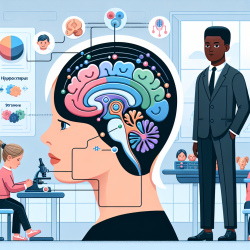Introduction
As practitioners in the field of speech-language pathology, understanding the intricate workings of the brain is crucial for creating effective interventions. A recent study, "Midlife Managerial Experience is Linked to Late Life Hippocampal Morphology and Function," provides valuable insights into how occupational experiences can influence brain structure and function. This blog explores how these findings can be applied to improve therapeutic outcomes for children, encouraging practitioners to delve deeper into the research.
The Study's Key Findings
The research highlights that individuals with high managerial experience (HME) during midlife exhibit larger hippocampal volumes in late life, which correlates with better memory function. Interestingly, these individuals rated their memory proficiency lower, a phenomenon linked to decreased functional connectivity between the right hippocampus and right prefrontal cortex. This dual finding suggests a complex relationship between occupational experiences, brain structure, and self-perception of cognitive abilities.
Implications for Practitioners
Understanding the relationship between brain morphology and cognitive function is essential for speech-language pathologists, especially when working with children. Here are some ways practitioners can apply these findings:
- Early Intervention: Recognize the importance of cognitive engagement in childhood. Encourage activities that stimulate cognitive development, which may contribute to healthier brain morphology later in life.
- Holistic Assessment: Consider both objective cognitive performance and subjective self-assessments when evaluating a child's progress. This dual approach can provide a more comprehensive understanding of a child's cognitive abilities.
- Parental Involvement: Educate parents about the role of cognitive stimulation and engagement in their child's development. Encourage them to provide enriching experiences that promote cognitive growth.
Encouraging Further Research
While the study offers valuable insights, it also opens the door for further exploration. Practitioners are encouraged to investigate the following areas:
- Longitudinal Studies: Conduct research to explore how early cognitive experiences influence brain morphology and function over time.
- Functional Connectivity: Investigate how different types of cognitive activities impact functional connectivity in the developing brain.
- Intervention Strategies: Develop and test intervention strategies that leverage cognitive engagement to enhance brain development in children.
Conclusion
The study on midlife managerial experience and hippocampal function provides a compelling case for the impact of cognitive engagement on brain health. By applying these insights, speech-language pathologists can enhance their practice and contribute to better developmental outcomes for children. To read the original research paper, please follow this link: Midlife managerial experience is linked to late life hippocampal morphology and function.










